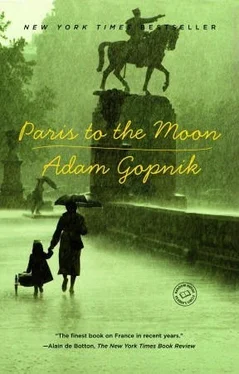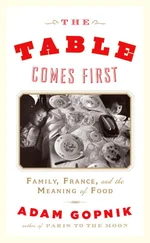It has a little glowing window on its face where it affiches, or posts, the events and troubles of its day, its operating life. The window flashes, for instance, a shocked, offended Pas d’iden-tite!— no identity!—when the fax machine at the other end doesn’t “identify itself,” which for some reason or another most American machines don’t seem to.
But the favorite, all-purpose affiche of my fax machine is erreur distante— distant error—which it affiches all the time, no matter where the error actually originates, far away or right in its own backyard. Whether the error comes from a fax machine in Lille or Los Angeles, it says that it is a distant error. When the machine itself has run out of paper, it is still a distant error. When I have forgotten to clean the ribbon heads, an error has nonetheless taken place, at a distance. Jams and overflows, missed connections, and faulty plugs: all are erreurs distantes. When it really is a distant error, it is still just another distant error. This is the French fax machine’s way of getting through life. The error is distant; the problem lies someplace else; there is always somebody else to blame for your malfunctions.
French intellectuals and public people, I have on certain occasions come to the mordant, exasperated, and gloomy conclusion, share the same belief, affiche the same accusatory message, banding together and flashing erreur distante, whenever they run out of paper or ink or arguments. This morning, for instance, I saw the economist Emmanuel Todd being interviewed about his book on the economic “stagnation” of industrialized economies. He blandly announced that the U.S. economy was just as stagnant as France’s, in fact was worse because its “cultural level” (by which he meant the level of education) was so much more depraved. Also, the United States manufactured less than it once had. Economic stagnation was the problem of all the industrialized economies, France was simply sharing in it, and the United States was really to blame. His debating opponent, an intelligent economist named Cohen—very poorly dressed in a brightly colored blazer and bad tortoiseshell glasses—tried to explain that this wasn’t so, that the fall in manufacturing was in fact a sign of the renovation of the American economy, and that whatever its flaws in equality, the growth in America was real, that the one thing you couldn’t call the American economy was stagnant. Todd, who looked terrific, hardly bothered to argue with him; he just made the same assertions again: The American economy is stagnant. He just affiched, like my fax machine erreur distante, and the host, terrified, nodded.
A while ago I was on a panel broadcast for France-Culture, the radio station, at the Sciences Po, the great political science school, along with Philippe Sollers and other French worthies, and we talked about the influence of American culture on France. Everyone took it for granted that the American dominance in culture was a distant error or, rather, a distant conspiracy organized by the CIA and the Disney corporation. (I was there, the sole American on the panel, to be condescended to as the representative of both Michael Eisner and William Colby, with mouse ears on my head and a listening device presumably implanted inside them.) The cliches get trotted out—that Jackson Pollock and the abstract expressionists got put over by the CIA, etc.—with a complacent certitude, and it was taken for granted that the relative decline of the prestige of French writing and painting has nothing to do with the actual decline of the quality of French writing and painting. (And yet when we got down to particulars, much of these prejudices vanished: Sellers and I actually had a reasonable debate about Roth and Updike. No American Sellers would have been able to name two French novelists, much less debate their value.)
What was maddening was not the anti-Americanism, which is understandable and even, in its Asterix-style resistance to American domination, admirable. What is maddening is the bland certainty, the lack of vigilant curiosity, the incapacity for critical self-reflection, the readiness to affiche erreur distante and wait for somebody else to change the paper.
A wise man, an old emigre artist, when I told him, gaily, that we were going to move to Paris, said soberly, even darkly: “Ah. So you have at last decided not to forgo the essential Jewish experience of emigration and expatriation.” I thought it was a joke, a highly complicated, ironic joke, but still a joke, since what could be less traumatic, in the old-fashioned emigre’s sense, less Cioran and Benjamin and Celan, than moving to Paris with a baby? But of course, what he said was true, or contained a truth. The reality is that after a year here everything about moving to Paris has been wonderful, and everything about emigrating to France difficult. An immigrant is an immigrant, poor fellow: Pity him! The errors arrive, and they tell me I brought them with me.
The loneliness of the expatriate is of an odd and complicated kind, for it is inseparable from the feeling of being free, of having escaped. Martha, the other day, spent the morning watching Luke open and shut the little gates that lead into the interior gardens at the Palais Royal. He would open the gate, she explained, walk through, watch it shut, and then walk back through again, with the rows of violet flowers in the background. She felt, she said, as if she had died and gone to heaven—but with the strange feeling that dying and going to heaven mean parting, leaving, and missing the people you left behind on earth. No wonder ghosts at seances are so blandly encouraging; they miss you, but they are busy watching someone else.
There is the feeling of being apart and the feeling of being a universe apart—the immigrant’s strange knowledge that the language and lore that carry on in your own living space are so unlike the ones right outside. (This is particularly true of our odd Canadian-American-Jewish-Sri Lankan-Franco-American menage, with the two-year-old at its center.) There is also the odd knowledge, at once comforting and scary, that whatever is going on outside, you are without a predisposed opinion on it, that you have had a kind of operation, removing your instant reflexive sides-taking instinct. When French politicians debate, I think, well, everybody has a point. After a year the feeling that everything was amusing, though, bombs and strikes an act in the Winter Circus, does begin to fade, to seem less amusing in itself. When Le Canard Enchatne, the satiric paper, comes out on Wednesday mornings, I buy it and generally enjoy, am even beginning to understand, most of the jokes and digs; what was largely incomprehensible to me at first is now self-evident: who is being mocked for what and why.
But I don’t actually care about who is being mocked. I am simply pleased to register that what I am reading is mockery. And the slightly amused, removed feeling always breaks down as you realize that you really don’t want to be so lofty and Olympian—or rather, that being lofty and Olympian carries within it, by tradition and precedent, the habit of wishing you could be down there in the plain, taking sides. Even the gods, actually looking down from Olympus in amusement, kept hurtling down to get laid or slug somebody.
After a first winter in Paris, when the lure of the chimney and cigar smell holds you in thrall, you become accustomed to them, and then all you notice is the dark. From November to April, hardly a single day when you see the sun. The light itself is beautiful, violet and gray, but it always looks as if it were planning to snow, and then it never does.
We had the seasonal pleasure of buying a (by Canadian standards, insanely overpriced) Christmas tree. We bought it from a Greek tree-and-plant dealer on the Ile de la Cite. It’s a nice tree, a big fir, green and lush, but, at our insistence, without that crazy wooden cross that the French insist on nailing to the bottoms of their Christmas trees, so that you can’t give them water. Ours is open, with a fresh cut, and sits in its watery pedestal, a red-and-open tripod, which we brought all the way over from Farm and Garden nursery down on Franklin Street in TriBeCa.
Читать дальше












